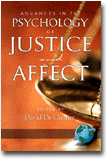
Advances in the Psychology of Justice and Affect
Edited by:
David DeCremer, Erasmus University
Published 2007
Leading scholars attempting to illuminate the developing trends in explaining and understanding the role that affect plays in justice and vice versa. The book comes at a particular fitting time as it is recognized that justice is in the eye of the beholder, but, unfortunately clear theoretical perspectives have not been clearly outlined yet. This book addresses this need by presenting a variety of perspectives advocating the further integration between both fields and how this may be achieved. Moreover, the book also provides a discussion of what we know as yet and where this integrative field should be going. The book is divided in three parts discussing the nature of justice and affect, justice, morality and affect, and justice and affect at work.
The market for this book is students, researchers in social psychology, organizational behavior and management, behavioral economics, philosophy, and other related social sciences fields. Graduate students and upper level undergraduates can make use of the book as a supplementary text.
CONTENTS
Part I: Introduction. Justice and Affect: When Two Friends Meet, David DeCremer. Part II: The Nature of Justice and Affect. Justice Violations, Emotional Reactions, and Justice-Seeking Responses, Alicia F. Bembenek, Denise R. Beike, and David A. Schroeder. Do the
Emotions of Others Shape Justice Effects? An Interpersonal Approach, David De Cremer, Gerben A. van Kleef, and Maarten J. J. Wubben. Hot Cognition and Social Justice Judgments: The Combined Influence of Cognitive and Affective
Factors on the Justice Judgment Process, Kees van den Bos. The Role of Emotions in Cross-Cultural Justice Research, Seger Breugelmans and David De Cremer. Part III: Justice, Morality and Affect. Emotional Responses Uncover the Contextual Meaning of Acting (Un)Fairly, Celia Gonzalez and Tom R. Tyler. Justice, Fairness, and Strategic Emotional Commitments, Timothy Ketelaar and Bryan Koenig. Passions for Justice, Elizabeth J. Horberg and Dacher Keltner. Part IV: Justice and Affect at Work. Scholarly Biases in Studying Justice and Emotion: If We Don’t Ask, We Don’t See, Thomas M. Tripp and Robert J. Bies. The Interplay between Justice and Affect in Groups, Barbara van Knippenberg, Daan van Knippenberg, and David De Cremer. A Cognitive-Emotional Theory of Customer Injustice and Emotional Labor: Implications for Customer Service, Fairness Theory, and the Multifoci Perspective, Deborah E. Rupp, A. Silke Holbu, and Alicia A. Grandey. Consequences of Interactional (In)justice: A Look at Leader Behaviors and Follower Perceptions, Nicole E. Kohari and Robert G. Lord. Part V: Conclusion. Justice and Affect: Where Do We Stand?, Jerald Greenberg and Deshani B. Ganegoda.
-
Paperback978-1-59311-773-3
Web price: $45.04 (Reg. 52.99)
-
Hardcover978-1-59311-774-0
Web price: $80.74 (Reg. 94.99)
- eBook9781607524663

- SOC000000 - SOCIAL SCIENCE: General
- EDU009000 - EDUCATION: Educational Psychology
- BUS041000 - BUSINESS & ECONOMICS: Management
-
 Dark and Destructive Leadership
Dark and Destructive Leadership
-
 Diversity, Equity, and Inclusion Insights in Practice
Diversity, Equity, and Inclusion Insights in Practice
-
 Flourishing in Contexts and Cultures
Sociocultural Perspectives on Fostering Youth Well-Being
Flourishing in Contexts and Cultures
Sociocultural Perspectives on Fostering Youth Well-Being
-
 Management Consulting in the Era of the Digital Organization
Management Consulting in the Era of the Digital Organization
-
 Perspectives on Race in Organizations
Perspectives on Race in Organizations
-
 Teaching Human Development for Educators
Teaching Human Development for Educators
-
 The Entrepreneurship SIG at the European Academy of Management
Setting the Base for Tomorrow's Challenges
The Entrepreneurship SIG at the European Academy of Management
Setting the Base for Tomorrow's Challenges

